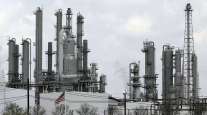U.S. Distillate Exports Rising, Even as Diesel Reaches $4.142
This story appears in the March 26 print edition of Transport Topics.
Even as U.S. diesel prices rose last week to the highest levels since 2008, the United States is continuing to export more of the fuel overseas, according to Department of Energy figures.
U.S. distillate exports averaged 1.12 million barrels per day between Feb. 10 and March 9, DOE’s Energy Information Administration said.
In comparison, distillate exports averaged 854,000 bpd for all of 2011, which was well above the 656,000 bpd exported on average in 2010.
An official at the American Petroleum Institute in Washington said oil companies are exporting diesel because they can charge more for it overseas.
Rayola Dougher, senior economic advisor at API, said premium prices for diesel abroad give U.S. refineries a reason to export it.
“If we didn’t supply it, someone else would,” she said, noting that the United States is exporting a lot of diesel to the Netherlands, France and South America.
DOE reported on March 19 that retail diesel in the United States edged up 1.9 cents to $4.142 a gallon, while gasoline rose 3.8 cents to $3.867.
It was the eighth straight weekly increase for diesel and the 10th in 11 weeks. Diesel is now priced 23.5 cents higher than at the comparable time in 2011, DOE said. It is at its highest level since hitting $4.764 in July 2008.
For gasoline, it was the eighth straight price increase and the 12th in the past 13 weeks. Gasoline is 30.5 cents higher it was at this time in 2011.
Sander Cohan, an analyst with Energy Security Analysis Inc., Wakefield, Mass., said that diesel exports have little to do with pricing.
Instead, current prices reflect crude inventories and tensions over Iran and its nuclear intentions. He also said the complexity of refining crude into ultra-low-sulfur diesel and a fear over supply shortages because of East Coast refinery shutdowns (3-5, p. 1) add to diesel pricing uncertainty.
API’s Dougher agreed, saying that U.S. exports are not having a significant effect on retail diesel prices.
Diesel exports are growing as both distillate consumption and stocks are dropping in the United States.
Distillate consumption was 3.59 million bpd for the week ended March 9, compared with 3.87 million the same week in 2011, EIA said.
Stocks were 136.6 million, as of March 16, down from 152.6 million barrel barrels a year earlier.
Neil Gamson, an EIA economist, said that, although there have been discussions about the government stepping in to curtail distillate exports, potential restrictions would not make much of a difference — because diesel pump prices are determined by a number of factors, including supply and demand for fuel as well as the price of crude.
Truckers, meanwhile, said they believed the practice should be stopped, especially with pump prices so high.
“We’re making it more beneficial for refineries to ship product out of the country when they can sell it right here. It tells me constraints are in place to keep them from selling it here,” said Blake Grindstaff, vice president of operations at Mountain City, Tenn., truckload hauler Danny Herman Trucking Inc.
Patrick Healey, president of truckload hauler Penns Best Trucking Inc., Tunkhannock, Pa., said he believes refined oil exports should be curtailed.
“Any oil produced or refined in this country should stay in this country, plain and simple,” he said. “I know it’s a global market, but the time has come to take care of our own country.”
Healey said concessions could be made to allow refineries to export a percentage of their output.
However, an analyst called blocking exports a gimmick.
“That’s like preventing Boeing from selling jets to Singapore Airlines to drive down cost the air travel,” said Mark Routt, a senior consultant at KBC Advanced Technologies Inc. in Houston. “What that will do is guarantee a loss of jobs in the United States.”




